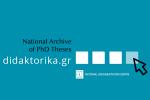
Interesting data on doctorate holders from Greek universities, in particular those receiving a doctorate in 2020, are included in the new publication 'Statistics on doctorate holders graduating from Greek universities in 2020' published by the National Documentation Centre (EKT). The publication presents statistical data (distribution of ISCED8 graduates per institution & department, region, dissertation’s field of science duration of ISCED8 studies, international mobility, previous degrees, etc.) on those completing their dissertation at Greek universities and awarded doctorates in 2020.
The new publication presents comparative analysis data on selected indicators for the period 2017-2020, as well as combined indicators for the distribution of new PhD holders by gender and age group; gender and scientific field of specialisation; duration of doctoral studies and source of funding for their studies, etc.
This particular edition is the fifth in a series published annually by EKT as the National Authority of the Hellenic Statistical System. The survey is based on primary data completed by 2020 doctorate holders themselves upon receiving their degree. Data collection is made in tandem with the depositing of doctoral dissertations in the National Archive of Ph.D. Theses (N.A.PhD.), that was created and has operated since 1985 by EKT. It should be noted that -in accordance with digital transformation of public sector processes and services- EKT has recently redesigned the electronic deposit system and the fully digitalised process of collecting PhD theses in the N.A.Ph.D.
According to the dissertation submission data in the N.A.Ph.D. 1,681 new doctorates were awarded by Greek universities in 2020. Figures for new doctorates awarded by Greek universities over the period 2005-2020 are shown in the following diagram.
Regarding the distribution of the new doctorates awarded by Greek universities in 2020, most dissertations were completed at the National and Kapodistrian University of Athens (NKUA) and the Aristotle University of Thessaloniki (AUTh), 25% and 20%, respectively. They are followed by doctorate holders preparing their dissertations at the University of Patras, the National Technical University of Athens and the University of Thessaly (6% -8%).
As for the distribution of new doctorates by Region based on the seat of the University, in 2020, most of the new doctorate holders received their doctorate from institutions in the Attica Region, followed by the Regions of Central Macedonia, Western Greece, Thessaly, Epirus and Crete.
Most dissertations were relevant to Medicine and Health Sciences (30.8%), followed by Social Sciences (24.7%) and Natural Sciences (22.3%). Lower percentages were recorded for Humanities & Arts (14.8%), Engineering Sciences and Technology (14.7%), and Agricultural Sciences & Veterinary (2.7%).
The majority of doctorate holders in 2020 completed their dissertation in 4 years (20.3%), followed by those taking 5 or 6 years to complete their dissertation (16.2%).
In terms of gender distribution of new doctorate holders, the share of male doctorate holders was marginally higher than that of women (50.7% compared to 49.3%).
Regarding the distribution of 2020 PhD holders by sex and scientific field, data show that women are majority in the fields of Social Sciences, the Humanities, and Medicine and Health Sciences (59.5%, 54.7% and 50.3% respectively). On the other hand, men excel in the fields of Engineering and Technology, Natural Sciences and Agricultural Sciences (66.7%, 55.2% and 51.4%, respectively).
The combined indicators presented in this new EKT publication, include the distribution of new doctorate holders by source of funding and the duration of completion of doctoral studies. In the case of those who completed their studies in 4-5 years, scholarships from a Greek institution was the main source of funding. In other groupings of ISCED8 studies’ duration, namely 3 years, 6-9 years and 10 years and over, the significance of personal savings and family support as a source of funding was higher, compared to funding by scholarships.
As far as international mobility of doctorate holders is concerned, it appears that 245 people (16.9% of the total number of respondents) stayed abroad during their doctoral studies for reasons other than tourism. The most popular countries were the United Kingdom (20.8%), Germany (19.6%) and the USA (14.7%). According to responses of those who stated that they had lived abroad during the preparation of their doctoral dissertation, 63.5% settled abroad as part of his/her research, 22.3% moved in search of a job, while 6.0% for family/personal reasons.
Time data and recording of trends for Greek doctoral candidates
Regarding the time figures for the period 2017-2020, it is worth noting that the highest shares of male doctorate holders refer to 2017 and 2020 new PhD holders. For women doctorate holders the highest percentage was in 2019, while there was perfect balance between men and women in 2018.
It is interesting that, for the years 2017-2020, the main source of funding for doctoral studies is personal savings and support from family. However, scholarships from a Greek institution as a key source of funding shows an increasing trend, especially for doctorate holders in 2019 and 2020.
According to the data on Greek doctorate holders for the period 2017-2020, NKUA and AUTh are the universities where most doctoral dissertations are completed, followed by the NTUA and the University of Patras. Most new doctorate holders belong to the age group 35-44 (except in 2018), followed by the 25 to 34 age group.
In terms of scientific specialisation based on the 6 main scientific fields of the Frascati classification for the period 2017-2020, most new doctorates awarded by Greek universities were relevant to Medicine and Health Sciences, followed by Natural Sciences and Social Sciences and Engineering and Technology. Finally, most doctorate holders of those years completed their dissertation in 4 to 5 years.
The full edition 'Statistics on doctorate holders graduating from Greek universities in 2020' is available here at metrics.ekt.gr.













